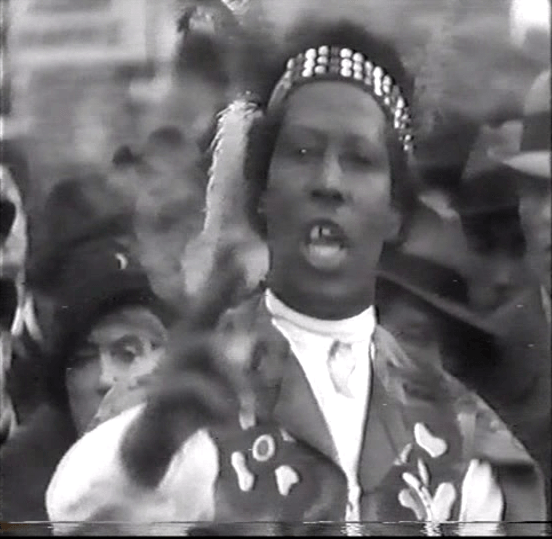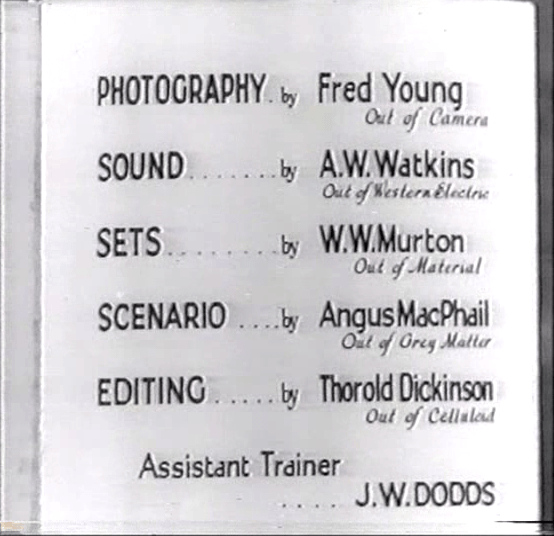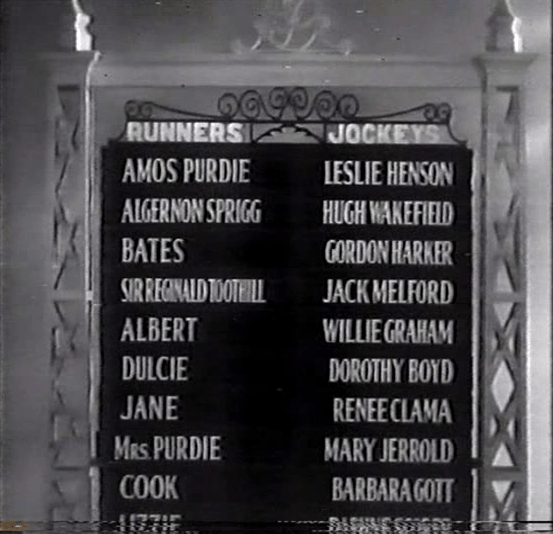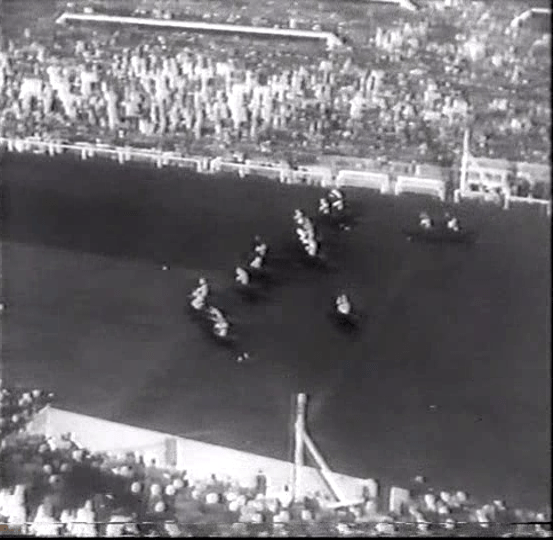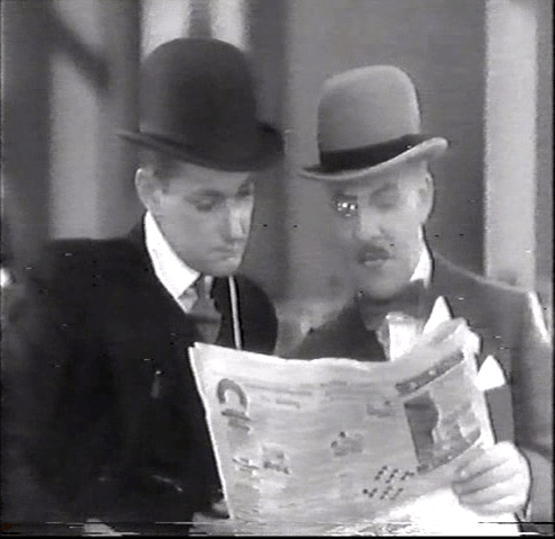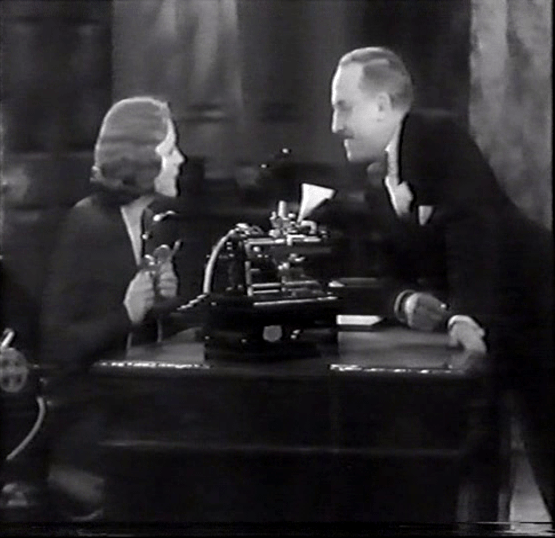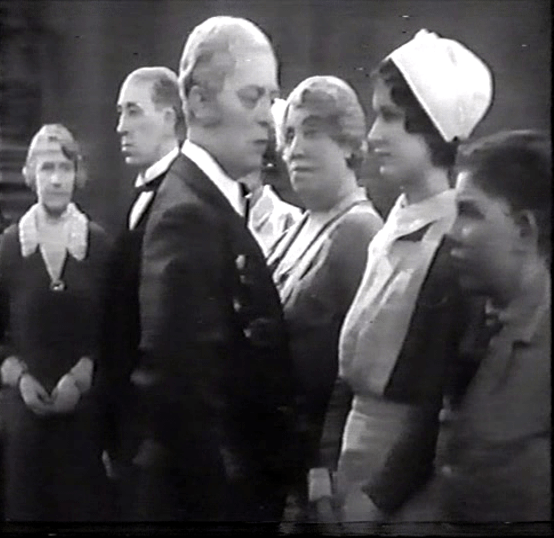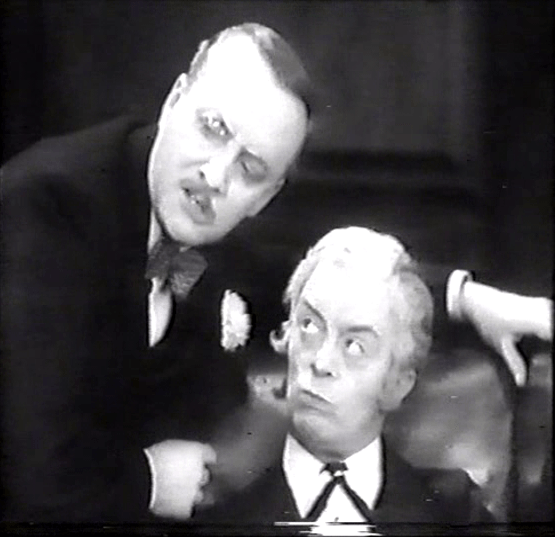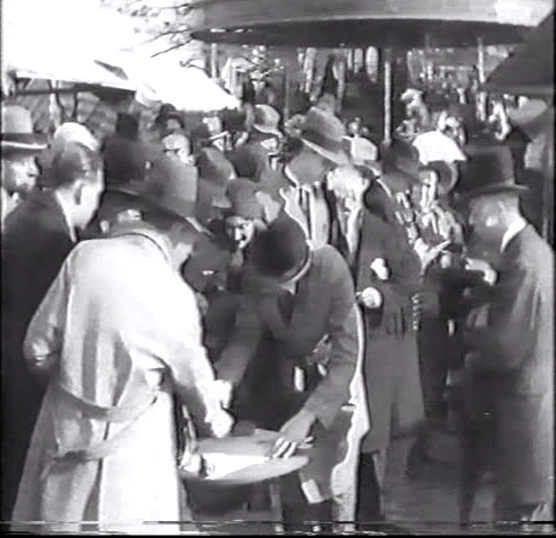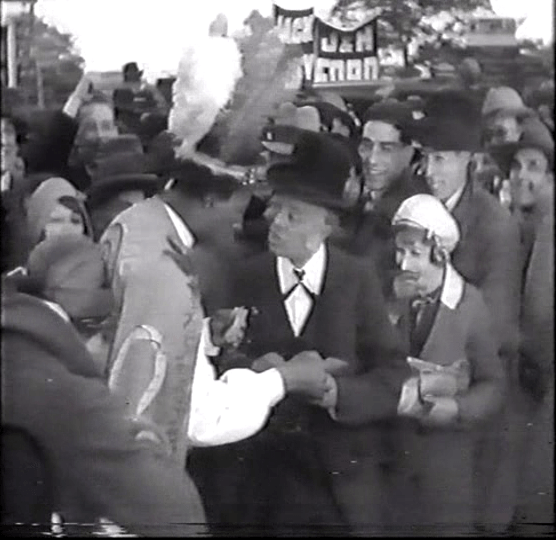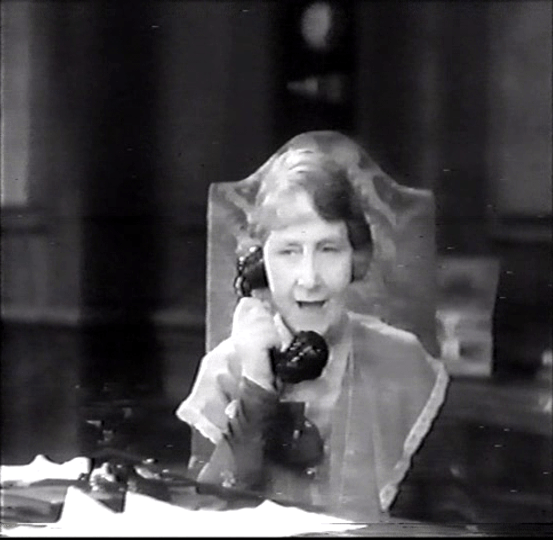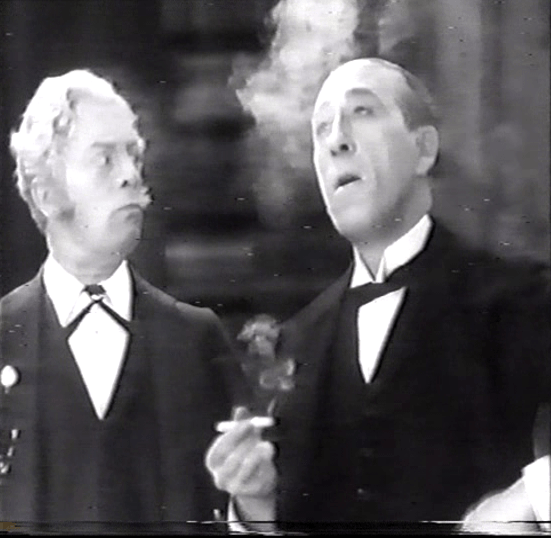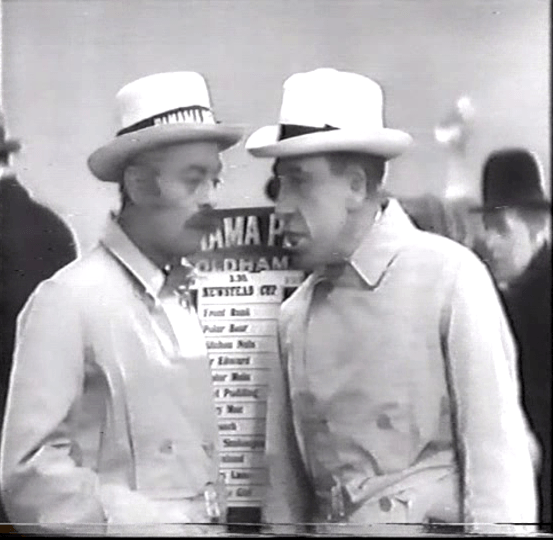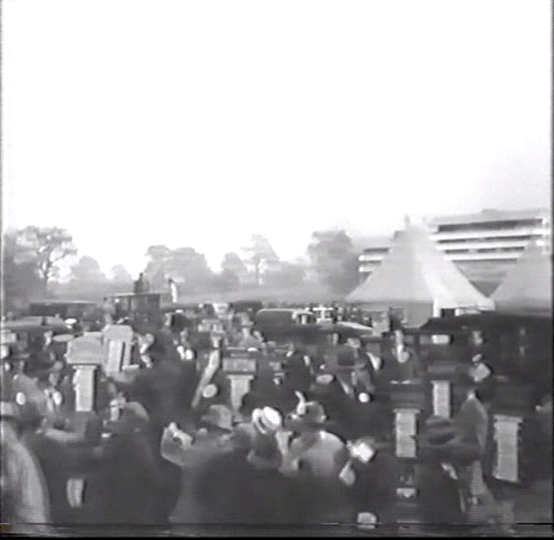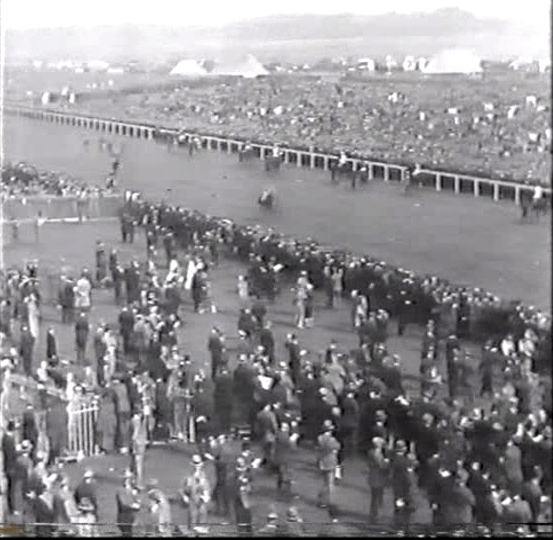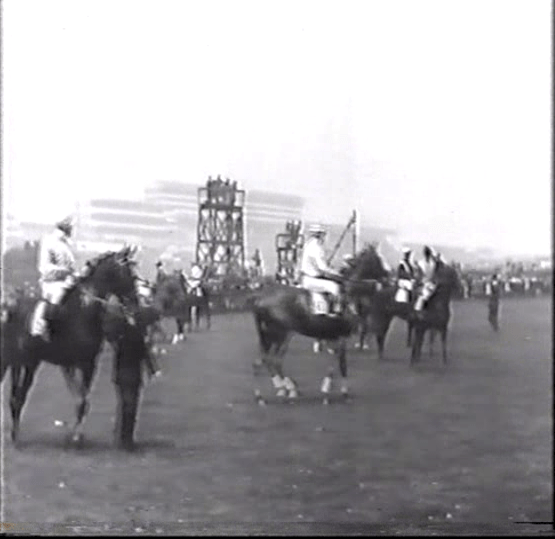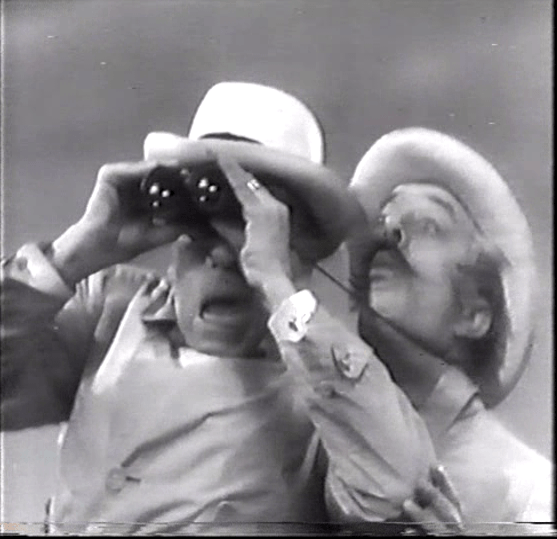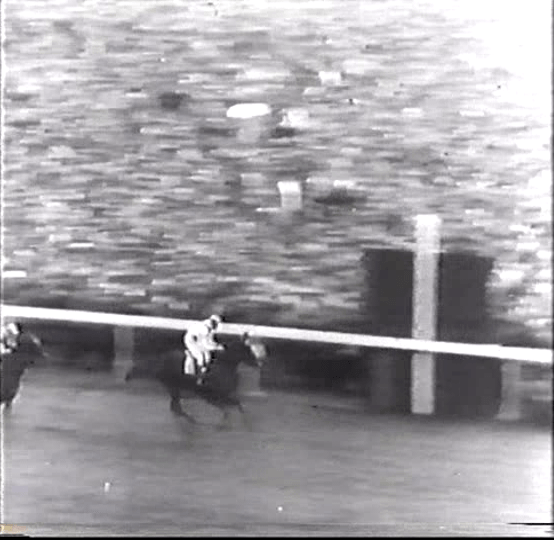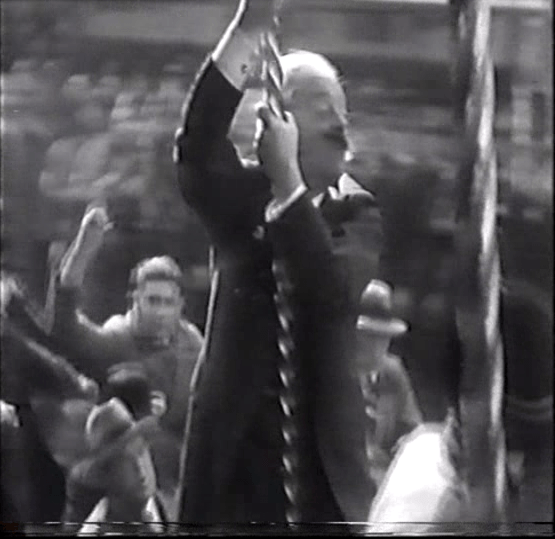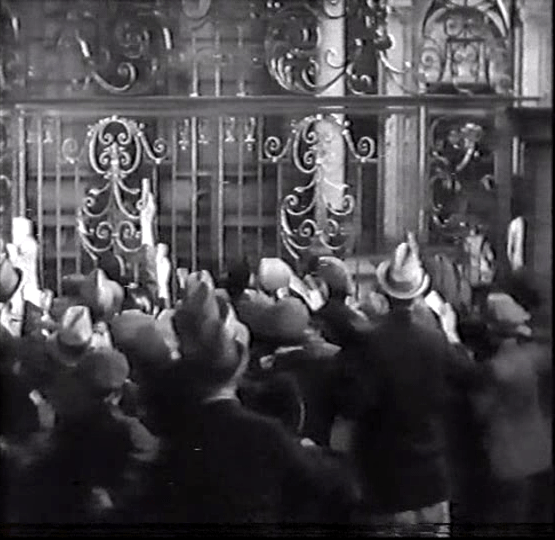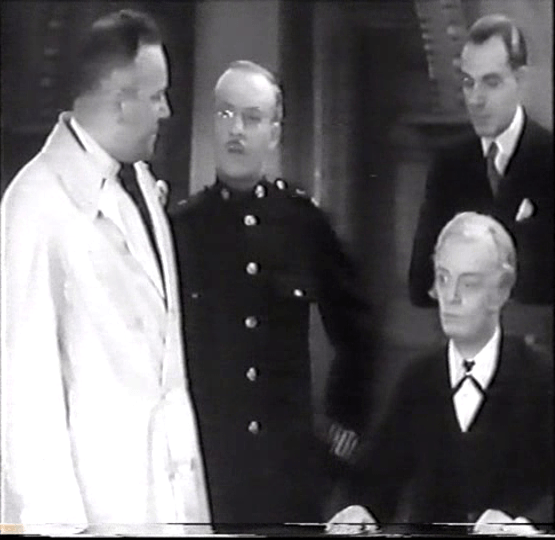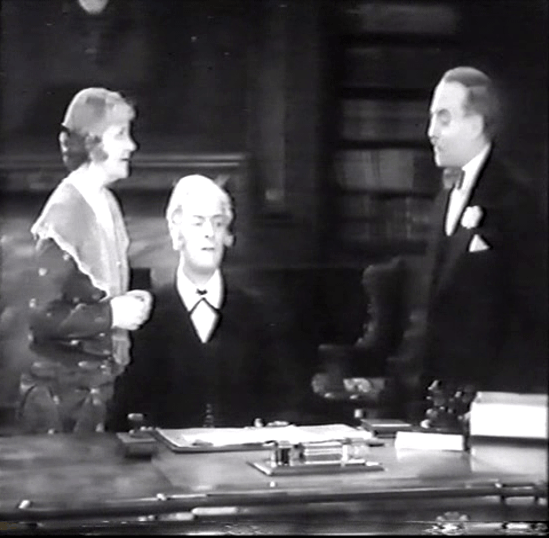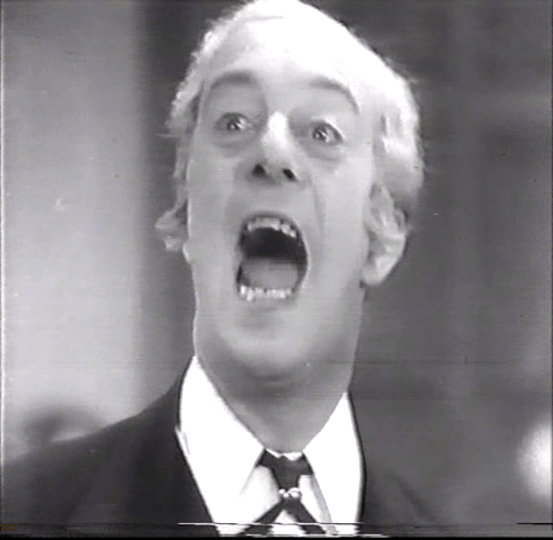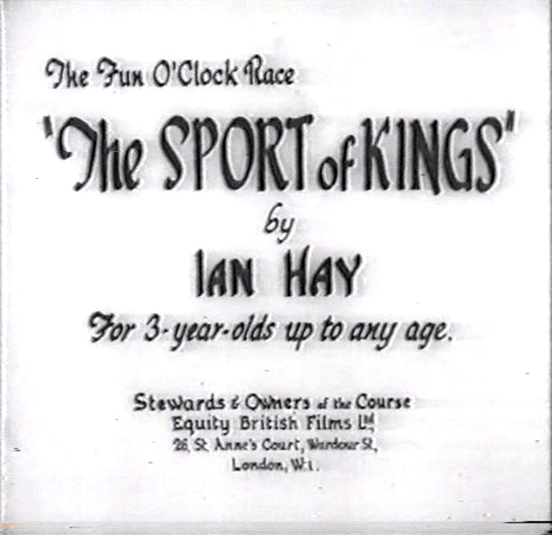
The Sport of Kings (1931)
Tagline: "A stern Justice of the Peace takes over a firm of bookmakers."
Starring: Leslie Henson, Hugh Wakefield, Gordon Harker, Jack Melford, Dorothy Boyd
Featured Racecourse: Epsom
Director: Victor Saville
Producer: Victor Saville
Writer: Angus McPhail
Release Date: February 1931
Runtime: 90 mins (B&W)
DVD Synopsis: Detesting the sport of gambling until he unexpectedly makes a big win on the horses himself, a now-obsessed man starts his own illegal betting set-up and nearly loses everything he has in this racetrack comedy of British origin.
Where to Buy: Classic Reelz
Film Links: IMDB, BFI, Wikipedia
Starring: Leslie Henson, Hugh Wakefield, Gordon Harker, Jack Melford, Dorothy Boyd
Featured Racecourse: Epsom
Director: Victor Saville
Producer: Victor Saville
Writer: Angus McPhail
Release Date: February 1931
Runtime: 90 mins (B&W)
DVD Synopsis: Detesting the sport of gambling until he unexpectedly makes a big win on the horses himself, a now-obsessed man starts his own illegal betting set-up and nearly loses everything he has in this racetrack comedy of British origin.
Where to Buy: Classic Reelz
Film Links: IMDB, BFI, Wikipedia
Personal Review
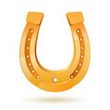





Sir Reginald Toothill (Jack Melford) is having a run of bad luck at the races and announces to his friend Algernon Sprigg (Hugh Wakefield) that he is through with betting. Sprigg calls his bluff and bets him a fiver that he will place a bet again - Toothill accepts the wager – “oh you cad!” Toothill announces. A frank discussion about gambling takes place and Sprigg asserts that, “no normal human can do without a little gamble now and then”, using a daily newspaper full of adverts for sports betting, lotteries, raffles, stocks and shares etc., to illustrate the point and claims that he could make the staunchest anti-gambler place a bet. They come across a newspaper advert asking for two earnest young men to lodge as paying guests at the country mansion of Amos Purdie, a Justice of the Peace and chairman of the Anti-Betting Association. The mansion is located next to Newstead racecourse (Epsom) and it just so happens to be the Newstead races that week so Sprigg wagers a £100 with Toots that he can make Purdie back a horse within the week whilst staying at the house.
Spriggs and Toots meet up with Purdie at his country mansion and agree to the terms of their stay and when asked about their profession they announce that they’re punters. Purdie responds, “no man who is associated with the turf can remain respectable” but announces he is a man of broad views and allows the guests staying in the hope of them changing the error of their ways. Purdie assembles his staff and preaches to them about the upcoming Newstead races and advises them all to stay indoors and avoid any temptations during the “carnival of shame”. When Purdie leaves the room it soon becomes clear that his servants are all gamblers and that the bell boy is their bookies runner - the cook, for example, asks for a “tanner (six-pence) each-way Virgins Tangle, any-to-come Imperial Punt.”
Meanwhile, Spriggs overhears Purdie and his secretary Dulcie Primrose (Dorothy Boyd) discussing the JP’s outstanding super tax bill and the fact that he refuses to pay until the very last minute so that he can earn interest on his savings – “it’s the small economies that count”. This gives Spriggs an angle to set his plan in motion and he tells Purdie about a chap he once knew who paid of all his debts (including his tax bill) by backing the winner of the Lincoln Handicap at 66/1. Purdie then becomes inquisitive about horse betting and learns about bookmakers and racing tipsters (turf prophets) and is told that that one such tipster has recommended backing “Hobbledehoy” at Windsor the next day.
Purdie pays a visit to Martin Maggs, a turf accountant based in Piccadilly and opens a discreet account with the bookmaker under the pseudonym “Luv-a-duck” with bets placed by Telegram or phone using flower varieties as the wager amount i.e. carnation equating to £5. Purdie places his first ever bet on “Hobbledehoy” and wins £200 which turns him into an overnight gambler. He attends the Newstead races (Epsom) for the first time and purchases a racing tip from Prince “I’ve gotta horse” Monolulu, with the envelope containing the selection of Kitchen Nuts in the Newstead Cup. Back at the house Purdie’s wife makes a phone call to order some coal (kitchen nuts) for the house but gets the wrong number and ends up mistakenly placing a bet of £100 each-way on Kitchen Nuts!
Purdie returns home from the races to place some bets on the phone but his butler Bert Bates (Gordon Harker) catches him in the act and blackmails Purdie for a large severance deal. Purdie asks Bates to leave the house immediately before confessing to owing £4000 to Mr Mags due to his failed bets over the last week. Bates announces that he used to be a bookmaker clerk himself working for Panama Pete of Oldham and that he still has the blackboard, book, satchel and panama hats. He takes pity on Purdie and advises that he can help him win back all of his losses by becoming a bookmaker for the day at Newstead Races, “6/4 the field, 2/1 bar one, the game, the game, the game!”
The two of them head to the races, Purdie in partial disguise, and they set up a bookmaker’s pitch in the public enclosure and lay Kitchen Nuts at enhanced odds to the tune of £500. Unfortunately for Purdie and Bates, Kitchen Nuts win the race so they decide to welch on the bets and make a run for it pursued by an angry mob. Purdie is eventually caught and is thrown into a pond before being rescued by Spriggs, dressed as a policeman, who, along with the servants and Toothill, manage to get him safely back to the house. The angry mob are still baying for blood and eventually break into the house but Spriggs, pretending he’s from Scotland Yard, manages to persuade a local officer to quell the unrest and remove the mob from the house. The real Panama Pete also turns up and demands compensation for his firm losing money to the imitators and it also transpires that Bates left him owing a monkey (£500) – when he catches sight of Bates, he chases him out of the house. Finally, Purdie learns that his wife placed a large bet on Kitchen Nuts by mistake and all his well when he realises that his debts are now settled.
The Sport of Kings was a Gainsborough Pictures comedy based on a Ian Hay’s 1924 play which originally ran for ten months at the Savoy Theatre. The film was primarily shot at Elstree studios with location shooting at Epsom racecourse on Derby Day – called Newstead racecourse in the film. The opening sequence of the film portrays the excitement of Derby day at Epsom with vast crowds, tipsters, swathes of bookmakers, men watching the racing through binoculars and various speeded up scenes of horses racing. The opening credits are then rolled and I like the way they present the production team in racecard format – ‘Sound by A.W. Watkins out of Western Electric’, as well as presenting the cast list on a runners and riders board. The film title page also leaves you in no doubt that this film as about the horse racing industry – ‘The Fun O’Clock Race’ and “For 3-year-olds up to any age”.
Then follows a very interesting conversation between Toots and Spriggs in the racecourse champagne bar with Spriggs maintaining that everyone is a gambler deep down – he uses a daily newspaper to illustrate the point which is full of adverts for sports betting, football pools, raffles, stocks and shares etc. This fact is even more prevalent today with newspapers, television, films, social media and radio all carrying adverts for bookmakers, financial companies and various lotteries so it’s no wonder we’re a nation of gamblers, but we are becoming more conscious of the side effects with the national “Gamble Aware” programme in full swing. There was a very strong anti-gambling movement during the inter-war years, especially following the introduction of course totalisers in 1929, and Sport of Kings basically pokes fun at those organisations and almost glamourises gambling to a certain extent.
There is one beautifully shot rolling scene (film photographer Fred Young) where Purdie enters Newstead racecourse for the first time with the rest of the crowd and we get to see a coach and horses, food and liquor stalls, tipsters (Prince Monolulu in his first of many racing film appearances), pop-up gambling dens, fairground rides, cockney pearly kings, bookmakers, old cars and anti-betting demonstrators which all add up to create an electric atmosphere. I also like the scene where the mob catch up with Purdie on the carousel and there are wonderful close up shots of him clinging on to a horse post for dear life before finally succumbing to gravity.
I absolutely love the old English vocabulary used in the film with such phrases as; “Oh you cad”, I’m sorry I’m sure”, “old stiff”, “stout fellow”, “dear little girl”, “I say”, “come off your perch”, “God love a rotter” and “that’s the talk” bringing a smile to my face. I also like the fact that Spriggs and Toots have little black betting books where they make a note of all their wagers, something I still do today even though all transactions are logged online.
Not everyone shares my views on this film though – Stephen Glynn in his book ‘The British Horseracing Film’ (2019) states, “the films snail-slow delivery especially from revue comedian Henson” and the problems rising from “faithfully photographing a stage play” left Sport of Kings “a cinematic non-starter”. Henson’s acting was also criticised by ‘Naughty Bots’ in his IMDB review (2008) which states, “Henson's tendency to plod excessively and lead an unnecessarily long pause between lines is exaggerated in this film.” Purdie’s lines are delivered in a slow and deliberate way but I liked his mannerisms and facial expressions, complete with large bulging eyes - in fact he reminded me of a modern-day Nigel Farage in a grey wig.
The one part of the film I didn’t like was the unlikely romance between Spriggs and Dulcie which came across as very creepy, especially considering Spriggs was twenty years older. As soon as they met, Spriggs forced his company on Dulcie and referred to her as “‘his dear little girl”. She initially sees his behaviour as insulting and warns him off but his persistence and promise to give up gambling win her over in the end. The racing scenes in the film are also sub-standard but we do get some nice shots of Epsom racecourse on Derby day and the storyline was more about the gambling side of the industry than the horse racing anyway.
Most reviews I have come across for this film are quite negative such as that of ‘Antique Farce’ on IMDB (2008) stating; “Quite frankly there is very little entertainment to be had from this film, in fact I defy you to laugh once!” I can assure I laughed quite a few times during the film and for me it offered an intriguing insight into the bookmaking and gambling industry in the early 1930s smattered with the delightful English vocabulary of the time. Spriggs belief that everyone is gambler deep down probably holds a certain amount of truth today, obviously to varying degrees, but even somebody who buys the odd lottery ticket, enters a school raffle or has their pension savings in the stock market could be considered a gambler. (Rating 6/10)
Most reviews I have come across for this film are quite negative such as that of ‘Antique Farce’ on IMDB (2008) stating; “Quite frankly there is very little entertainment to be had from this film, in fact I defy you to laugh once!” I can assure I laughed quite a few times during the film and for me it offered an intriguing insight into the bookmaking and gambling industry in the early 1930s smattered with the delightful English vocabulary of the time. Spriggs belief that everyone is gambler deep down probably holds a certain amount of truth today, obviously to varying degrees, but even somebody who buys the odd lottery ticket, enters a school raffle or has their pension savings in the stock market could be considered a gambler. (Rating 6/10)
Favourite Quotes
Algernon Sprigg: "Well Toothill son, what luck?"
Sir Reginald Toothill: "Luck, huh, I backed three of them, the first was left at the post, the second stopped to eat a dandelion, and if the third hadn't put on a burst of speed at the last moment, he'd of got mixed up with the next race."
MOVIE STILLS

